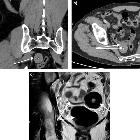peritoneal loose body







Peritoneal loose bodies or peritoneal mice are calcified pieces of necrotic tissue found in the peritoneal cavity. They are usually asymptomatic and small, ranging from 0.5 to 2.5 cm in size, but rarely may be up to 5 to 10 cm in size.
Clinical presentation
Loose bodies are usually asymptomatic .
Pathology
Peritoneal loose bodies are formed by the torsion and autoamputation of epiploic appendages. Epiploic appendages are suscepitible to torsion due to their narrow pedicle. Acute torsion produces epiploic appendagitis which is normally self limiting. However, chronic torsion results in the ischemia and subsequent calcification, fibrosis and autoamputation of the appendage with it then being released into the peritoneal cavity .
Radiographic features
CT
- centrally calcified soft tissue mass
- mobile mass, moving to the dependent position of the patient
- usually 0.5 to 2.5 cm in diameter, however may be up to 10 cm in size - termed "giant" loose body
Treatment and prognosis
Rarely they have been implicated in the development of urinary retention and bowel obstruction. If symptomatic, surgical removal may be required.
Siehe auch:

 Assoziationen und Differentialdiagnosen zu freie Gewebeformationen peritoneal:
Assoziationen und Differentialdiagnosen zu freie Gewebeformationen peritoneal:





